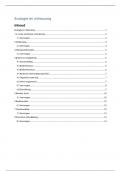-
1. Lecture notes - Identity politics: pride (sexuality) - sociology - making sense of society (seminar 5...
-
2. Lecture notes - Society under lockdown & health inequality - sociology - making sense of society (sem...
-
3. Lecture notes - Voter participation & report guidance - sociology - making sense of society (seminar ...
-
4. Lecture notes - Environment/capitalism/communism/business/patenting/gm food - sociology - making sens...
-
5. Lecture notes - Community and social capital - sociology - making sense of society (seminar 9)
-
6. Lecture notes - Activism & transformative sociology - sociology - making sense of society (seminar 10...
-
7. Lecture notes - Reading reports: global report on trafficking in persons 2018 - sociology - becoming ...
-
8. Lecture notes - Focus groups - sociology - becoming a sociologist (seminar 6)
-
9. Lecture notes - Quantitative methods vs qualitative methods - sociology - becoming a sociologist (sem...
-
10. Lecture notes - Task recap/module review of becoming a sociologist - sociology (seminar 10)
-
11. Lecture notes - Sociology and everyday life - introduction & module overview (week 1)
-
12. Lecture notes - What is everyday life? sociology and everyday life (week 2)
-
13. Lecture notes - Presentation skills, making love in the supermarkets, making sense of everyday life -...
-
14. Lecture notes - Symbolic interactionism - sociology and everyday life (week 4)
-
15. Lecture notes - Erving goffman: the present of self in everyday life - sociology and everyday life (w...
-
16. Lecture notes - Teams and regional behaviour erving goffman – &opencurlyquote;the presentation of self in everyd...
-
17. Lecture notes - Erving goffman: presentation of self in everyday life/stigma - sociology of everyday ...
-
18. Lecture notes - Erving goffman – stigma (notes on identity) - sociology and everyday life (week 8)
-
19. Lecture notes - Erving goffman – stigma (personal identity) - sociology and everyday life (week 9)
-
20. Lecture notes - Erving goffman, stigma & moral career/stigma – ego identity - sociology and everyda...
-
21. Lecture notes - Introduction to poverty in the uk - practicing sociology (week 1)
-
22. Lecture notes - Politicising poverty - practicing sociology (week 2)
-
23. Lecture notes - Report writing and assessment guidance - practicing sociology (week 3)
-
24. Lecture notes - Sociology and social policy - practicing sociology (week 4)
-
25. Lecture notes - Theorising new poverty: zygmunt bauman - practicing sociology (week 5)
-
26. Lecture notes - Representation of poverty in the news - practicing sociology (week 6)
-
27. Lecture notes - Visual sociology and ethics - practicing sociology (week 7)
-
28. Lecture notes - General attitude towards poverty in the uk - practicing sociology (week 8)
-
29. Lecture notes - Literature review - practicing sociology (week 9)
-
30. Lecture notes - Debating the causes of poverty - practicing sociology (week 10)
-
31. Lecture notes - Understanding social change - lecture notes 1, 2 and 3 (introducing theory, karl marx...
-
32. Lecture notes - Introducing sociological theory - understanding social change (seminar 1)
-
33. Lecture notes - Capitalism, communism, karl marx, false consciousness - understanding social change (...
-
34. Lecture notes - Du bois - understanding social change (seminar 3)
-
35. Lecture notes - Durkheim - understanding social change (seminar 4)
-
36. Lecture notes - Georg simmel - understanding social change (seminar 5)
-
37. Lecture notes - Max weber - understanding social change (seminar 6)
-
38. Lecture notes - Michel foucault - understanding social change (seminar 7)
-
39. Lecture notes - Feminism - understanding social change (seminar 8)
-
40. Lecture notes - Anthony giddens - understanding social change (seminar 9)
-
41. Lecture notes - Introduction to society and justice: gender, class, race and ethnicity - sociology an...
-
42. Lecture notes - Society and justice: gender - sociology and criminology (week 2 lecture and seminar n...
-
43. Lecture notes - Society and justice: class - sociology and criminology (week 3 lecture and seminar no...
-
44. Lecture notes - Society and justice: race and ethnicity - sociology and criminology (week 4 lecture a...
-
Show more





